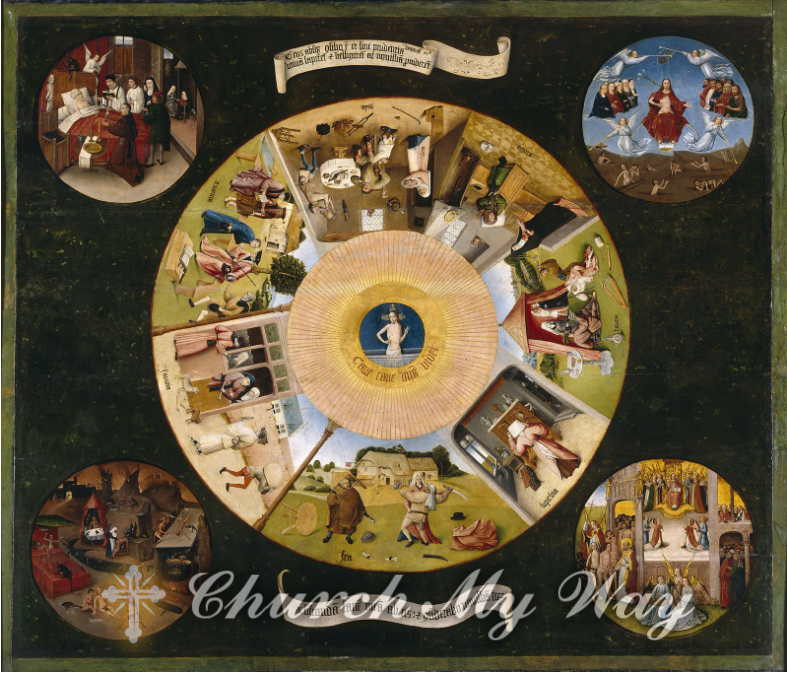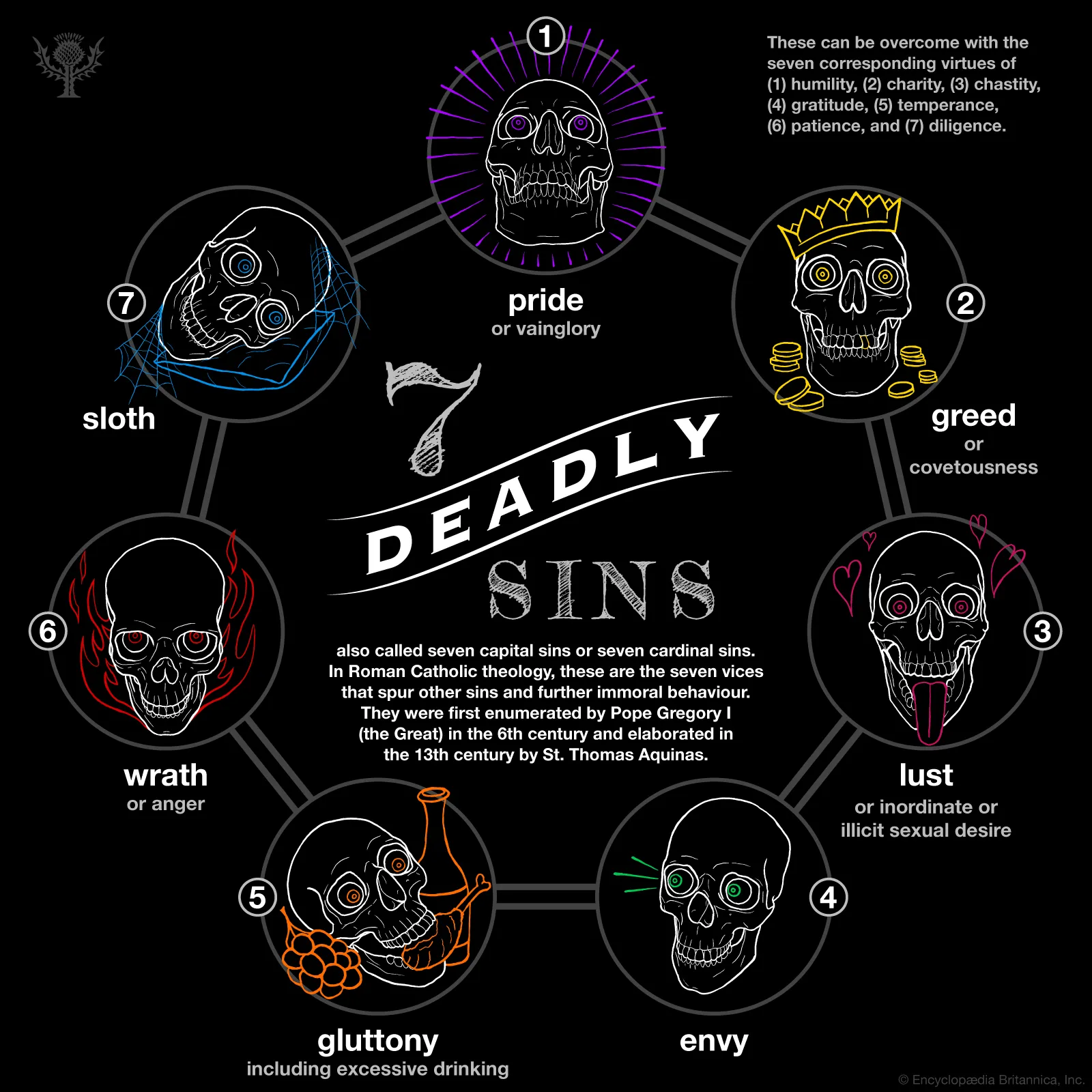7 Deadly Sins: A Journey Towards Redemption
Dear brothers and sisters in Christ, among these pitfalls, the 7 Deadly Sins hold a significant place, as we journey together on the path of faith, it is crucial to understand the pitfalls that can lead us astray. These sins, deeply ingrained in religious teachings and popular culture, serve as a guide to the vices we should strive to overcome. Let’s delve deeper into these sins, their implications, and how we can find redemption.
The 7 Deadly Sins: A Closer Look
The 7 deadly sins, also known as the capital vices, are considered to be the most destructive to spiritual growth. They are pride, envy, wrath, sloth, greed, gluttony, and lust. Each of these sins represents a specific kind of moral failing that can lead us away from living a righteous life. As it is written in Proverbs 6:16-19, there are things that the Lord hates, and these sins are among them.

Pride: The Sin of Excessive Self-Worth
Often considered the most severe of the sins, pride is an inflated sense of one’s status or accomplishments. It’s the sin that led to Satan’s fall from grace. When pride takes hold, it blinds us to our faults and leads us to underestimate the value and worth of others. As it is written in Proverbs 16:18, “Pride goes before destruction, a haughty spirit before a fall.”
Envy: The Sin of Coveting What Belongs to Others
Envy is the desire for others’ traits, status, abilities, or situations. It’s a sin that breeds resentment and discontentment, leading us to begrudge the blessings and achievements of others. As it is written in Exodus 20:17, “You shall not covet your neighbor’s house; you shall not covet your neighbor’s wife, or his male servant, or his female servant, or his ox, or his donkey, or anything that is your neighbor’s.”
Wrath: The Sin of Uncontrolled Anger
Wrath, or uncontrolled feelings of anger and hatred, can lead to destructive actions and behaviors. It’s a sin that disrupts peace and fosters hostility. As it is written in Ephesians 4:26-27, “In your anger do not sin: Do not let the sun go down while you are still angry, and do not give the devil a foothold.”
Sloth: The Sin of Spiritual Laziness
Sloth is more than just physical laziness. It also involves a lack of spiritual or emotional effort. It’s a sin that leads to complacency and hinders growth. As it is written in Proverbs 13:4, “The soul of the sluggard craves and gets nothing, while the soul of the diligent is richly supplied.”
Greed: The Sin of Excessive Desire for Wealth
Greed is an excessive desire for wealth or possessions. It’s a sin that can lead us to value material possessions more than our relationships with others and with God. As it is written in 1 Timothy 6:10, “For the love of money is a root of all kinds of evil. Some people, eager for money, have wandered from the faith and pierced themselves with many griefs.”
Gluttony: The Sin of Overindulgence
Gluttony is an excessive indulgence in food and drink. However, it can also apply to other forms of overindulgence. It’s a sin that prioritizes physical pleasure over spiritual well-being. As it is written in Proverbs 23:20-21, “Do not join those who drink too much wine or gorge themselves on meat, for drunkards and gluttons become poor, and drowsiness clothes them in rags.”
Lust: The Sin of Uncontrolled Desire
Lust involves intense or uncontrollable desire, often of a sexual nature. It’s a sin that can lead us to objectify others and prioritize our desires over their well-being. As it is written in Matthew 5:28, “But I tell you that anyone who looks at a woman lustfully has already committed adultery with her in his heart.”

Overcoming the 7 Deadly Sins
While the 7 deadly sins represent significant spiritual challenges, they are not insurmountable. With faith, self-awareness, and a commitment to personal growth, we can overcome these sins and cultivate virtues in their place.
Humility, the opposite of pride, involves recognizing our limitations and valuing others’ worth. By cultivating humility, we can appreciate the contributions of others and maintain a balanced perspective on our achievements. As it is written in James 4:6, “God opposes the proud but gives grace to the humble.”
Gratitude, the antidote to envy, involves appreciating what we have rather than longing for what others have. By fostering gratitude, we can find contentment in our blessings and rejoice in the blessings of others. As it is written in 1 Thessalonians 5:18, “Give thanks in all circumstances; for this is God’s will for you in Christ Jesus.”
Patience, the counter to wrath, involves maintaining calm and composure even in frustrating situations. By practicing patience, we can respond to challenges with grace and understanding, promoting peace over hostility. As it is written in Proverbs 14:29, “Whoever is patient has great understanding, but one who is quick-tempered displays folly.”
Diligence, the opposite of sloth, involves consistent effort and hard work. By developing diligence, we can overcome complacency and strive for growth in all areas of our lives. As it is written in Proverbs 12:24, “Diligent hands will rule, but laziness ends in forced labor.”
Generosity, the antidote to greed, involves giving freely and abundantly. By encouraging generosity, we can shift our focus from accumulating wealth to enriching the lives of others. As it is written in Acts 20:35, “In everything I did, I showed you that by this kind of hard work, we must help the weak, remembering the words the Lord Jesus himself said: ‘It is more blessed to give than to receive.'”
Temperance, the counter to gluttony, involves moderation and self-restraint. By promoting temperance, we can maintain a healthy balance between physical pleasure and spiritual well-being. As it is written in Galatians 5:22-23, “But the fruit of the Spirit is love, joy, peace, patience, kindness, goodness, faithfulness, gentleness, self-control; against such things, there is no law.”
Love, the opposite of lust, involves valuing others for who they are rather than for the fulfillment of our desires. By nurturing love, we can build meaningful, respectful relationships that honor the dignity of all individuals. As it is written in 1 Corinthians 13:4-7, “Love is patient, love is kind. It does not envy, it does not boast, it is not proud. It does not dishonor others, it is not self-seeking, it is not easily angered, and it keeps no record of wrongs. Love does not delight in evil but rejoices with the truth. It always protects, always trusts, always hopes, always perseveres.”
A Poem of Redemption
In the quiet of the night, and the bustle of the day,
Seven sins, like shadows, lead astray.
Pride, envy, wrath, and sloth, greed, gluttony, and lust,
In their grip, even the strongest may be thrust.But fear not, for the light of faith is near,
In the Word of God, the path is clear.
With humility, gratitude, and patience, we find,
Diligence, generosity, temperance, and love combined.These virtues, like a beacon, guide the way,
Through the darkest night, into the light of day.
So let us strive, with God’s grace, to transcend,
For in His love, all sins can mend.
Conclusion
The 7 deadly sins serve as a guide to the moral pitfalls we should strive to avoid. However, they also provide a roadmap to the virtues we should strive to cultivate. By understanding these sins and their implications, we can navigate our spiritual journey with greater wisdom and discernment. Remember, the path to redemption is not about perfection, but about continual growth, self-awareness, and striving to live a life of love and virtue.
Frequently Asked Questions
- What are the 7 deadly sins? The 7 deadly sins, also known as the capital vices, are pride, envy, wrath, sloth, greed, gluttony, and lust.
- Why are they called the ‘deadly’ sins? They are called ‘deadly’ because they are sins that can lead to spiritual death. They are considered particularly destructive to spiritual growth and moral integrity.
- Are the 7 deadly sins mentioned in the Bible? While the Bible does not explicitly list these seven sins together, it does speak against these behaviors in various passages.
- Can the 7 deadly sins be forgiven? Yes, like all sins, the 7 deadly sins can be forgiven. The key to forgiveness is sincere repentance and a commitment to change.
- How can we overcome the 7 deadly sins? Overcoming these sins involves self-awareness, repentance, and the cultivation of virtues. It also involves seeking God’s grace and guidance in our journey of personal growth.
References
- The Holy Bible, New International Version
- Aquinas, Thomas. “Summa Theologica.” 1274.
- Catechism of the Catholic Church, Second Edition
- Encyclopædia Britannica, Inc./Patrick O’Neill Riley






